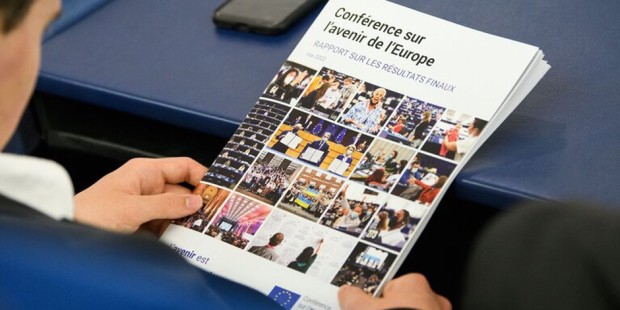Conference on the Future of the Europe : proposition 37
Strengthen the common European identity of the 27 Member States, educate European citizens on the values and principles of the European Union, this is a proposal that finally makes sense after 70 years of existence.
 The climate change and the European energy dependence are a real concern to European citizens. Foto: Philippe STIRNWEISS / © European Union 2022 / Source: EP
The climate change and the European energy dependence are a real concern to European citizens. Foto: Philippe STIRNWEISS / © European Union 2022 / Source: EP
(Elsa Woeffler) – Being part of the European Union is good, but understanding its ins and outs and its culture and history is better. Yet many Europeans do not know the difference between the European institutions and their roles, such as the difference between the European Parliament and the European Commission, for example. Also, many Europeans do not feel European, even though their country has been part of the European Union for some years. Making this European bubble more accessible is therefore one of the objectives of the European Citizens’ Panel for proposition 37. Indeed, integrating the citizen in an inclusive way in European decisions, communicating and having access to reliable information in an accessible language, such is the objective of this thirty-seventh proposition made by the European citizens’ panel at the Conference on the Future of Europe. But also, and above all, to allow the citizens of the twenty-seven Member States to access the same sources of information translated into their own languages thanks to the use of artificial intelligence and machine translation technologies. For although the European Union is a political and economic union, it is nonetheless a union of twenty-seven states, with twenty-seven more or less different cultures and languages.
Strengthening a common identity, sometimes even creating one. – Indeed, since its creation in 1993, the European identity has not been able to develop within the member countries. While for some, the European dimension is an everyday evidence, particularly for cross-border work and cities bordering other EU member states, for others, this dimension is a matter of imagination. Indeed, the European institutions communicate very little about their actions, have little contact between European citizens and organize few events with a European dimension. Yet Europe is at the heart of the lives of European citizens, without them knowing it. For example, very few hours of teaching are devoted to European history and political life, and European citizens have very little access to information about Europe, due to a lack of communication. As a result, there is a certain distance between the European institutions and its citizens. There is a phenomenon of disaffection on the part of European citizens because of this distance. In a survey carried out by Odoxa-Dentsu in 2019, only 29% of citizens felt that European integration was a “source of hope”. Two years earlier, in 2017, a statistic from Statista showed that only two thirds felt equally French and European. The feeling of belonging to the European Union is therefore not very widespread among the 27 Member States. A dynamic that needs to be changed, given the geopolitical situation of the Russian-Ukrainian crisis, but also the pandemic.
In order to allow for a real European identity in the future, in addition to the national identity of each member state, the European Citizens’ Panel has come up with different measures, six in total, to make the European Union more understandable and accessible in order to strengthen the bond between its citizens:
1. Ensuring a minimum amount of education about the European Union, in particular its democratic processes, without neglecting the history of European integration and European citizenship. People of all ages should be able to benefit from these programs, which should be designed in an attractive and age-appropriate way, for example by developing specific curricula and teaching materials for children, schools109 and civil society organizations involved in non-formal education.
2. Ensuring that all citizens have easy access to reliable information about the EU in an inclusive manner. The EU institutions should use more accessible language and avoid using bureaucratic jargon in their communications, while maintaining the quality and technical level of the information given, and adapting information to different communication channels and recipient profiles. They should consider, for example, the creation of a mobile application presenting information on EU policies in clear language. Special efforts should be made to address young people on social networks, but also through youth movements and various “ambassadors” (organizations and individuals) who explain the European project.
3. Making greater use of artificial intelligence and machine translation technologies to overcome the language barrier, ensuring that all digital tools are accessible to people with disabilities and easy to use.
4. Defending and supporting the freedom, pluralism and independence of the media, and encouraging the media, including public broadcasters, public news agencies and European media, to cover European affairs more regularly, while respecting their freedom and independence, so that such coverage is regular and comprehensive in all EU Member States, stepping up efforts to combat disinformation and foreign interference, and protecting journalists.
5. Bringing Europe closer to citizens by strengthening contact points and specialized centers (‘Europe Houses’) at local level, which would offer resources, information and advice to citizens on European issues, listen to their concerns and discuss with associations to help bring citizens’ views to the European level.
6. Taking further steps to strengthen a common identity among Europeans, for example through an EU fund that would encourage online and offline interactions (such as exchange programs, panels or meetings) of varying duration between EU citizens, organizing European sport events, creating joint teams, or making 9 May (Europe Day) an additional public holiday for all EU citizens.

Kommentar hinterlassen